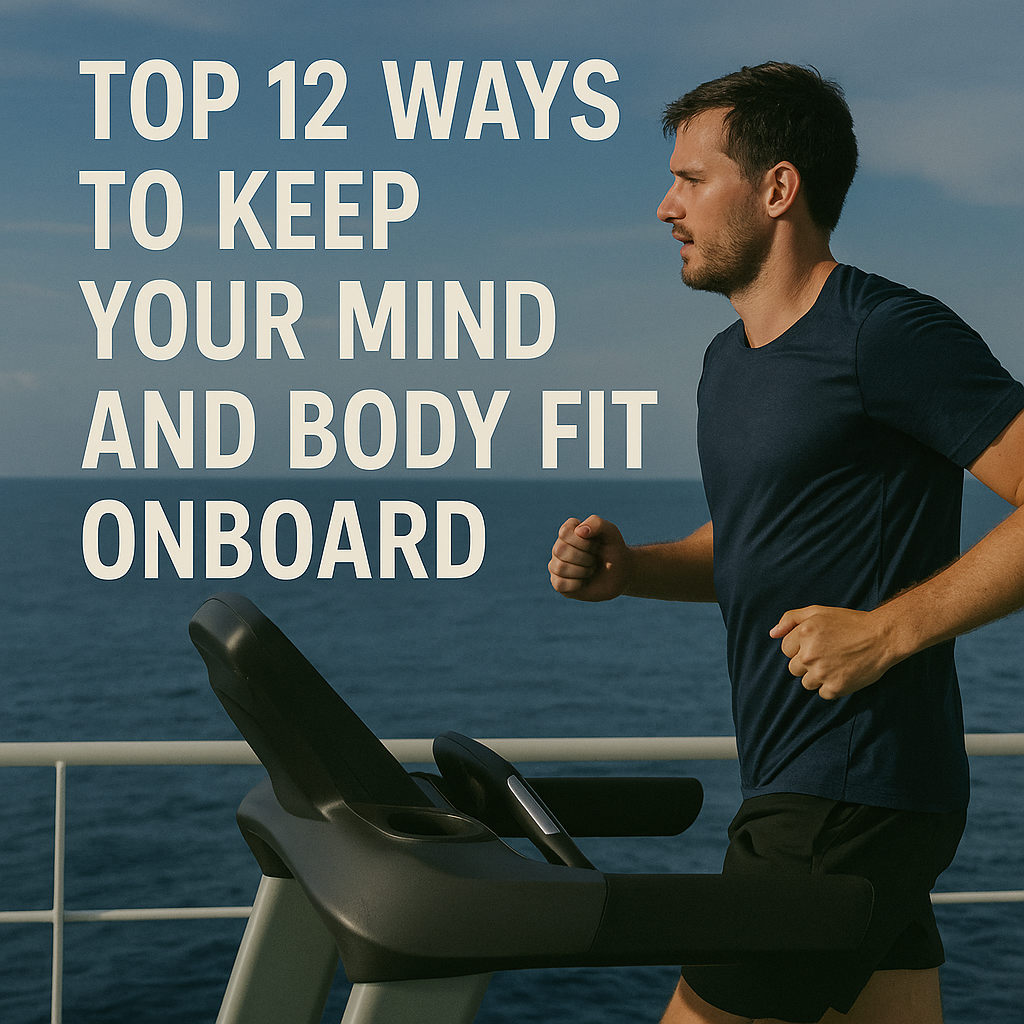Discover the top 12 ways seafarers can stay mentally and physically fit while working onboard. Learn practical tips backed by maritime health research and real-world success stories.

Why Mental and Physical Fitness Matter at Sea
Life at sea is no easy voyage. From long shifts and isolation to physical demands and unpredictable weather, the maritime world tests both mind and body. For seafarers, staying mentally sharp and physically strong isn’t just a luxury—it’s a necessity for safety, performance, and long-term health.
According to the International Transport Workers’ Federation (ITF), around 25% of seafarers experience symptoms of depression and anxiety, often worsened by isolation and irregular schedules. The International Maritime Health Association (IMHA) also reports that musculoskeletal injuries and fatigue-related disorders are among the most common health issues onboard. But there is good news. With simple routines, awareness, and discipline, seafarers can protect their wellbeing and thrive—even thousands of miles from shore.
1. Develop a Simple Onboard Exercise Routine
Keeping your body active helps combat fatigue, improves cardiovascular health, and maintains muscular strength for physically demanding tasks. Even if your ship doesn’t have a gym, creative options exist.
- Bodyweight workouts like push-ups, squats, planks, and lunges need no equipment.
- Use resistance bands or compact dumbbells for strength training.
- Set short daily goals (e.g., 20 minutes of movement in the morning).
A study published in the Journal of Occupational Medicine (Elsevier, 2021) noted that seafarers who exercised 3+ times a week had significantly lower stress scores.
2. Prioritize Balanced Nutrition
Healthy food helps stabilize mood, energy, and physical endurance. Yet, onboard meals may not always offer variety.
- Aim for protein-rich foods like fish, beans, and eggs.
- Choose fruits and vegetables when available—they support immune health and digestion.
- Avoid overreliance on fried or sugary foods which can contribute to sluggishness and poor sleep.
When possible, collaborate with the cook to plan healthier meals. Even small changes make a difference.
3. Stick to a Regular Sleep-Wake Cycle
Sleep is a pillar of mental health. But with watchkeeping duties and time zone changes, sleep often becomes fragmented.
- Create a dark, quiet space using earplugs or eye masks.
- Avoid caffeine and heavy meals before rest hours.
- Use relaxation apps or white noise to ease into sleep.
According to the IMO Model Course 1.21, fatigue management begins with structured rest. Quality sleep sharpens decision-making and reduces accident risk.
4. Practice Mindfulness and Meditation
Mental fitness means more than just avoiding stress. Practices like mindfulness meditation can reduce anxiety, improve emotional control, and even enhance immune function.
- Spend 5-10 minutes daily in quiet breathing or guided meditation.
- Try apps like Headspace or Calm (many have offline modes for at-sea use).
A 2022 study in the Marine Policy Journal found that mindfulness training reduced stress among seafarers by up to 40% over three months.
5. Cultivate Onboard Social Connections
Loneliness is a silent threat. Maintaining healthy, respectful relationships onboard can act as a psychological buffer.
- Initiate shared activities like movie nights or trivia games.
- Celebrate cultural holidays or birthdays together.
- Avoid gossip or negativity, which can erode morale.
According to BIMCO and ICS 2021 crew welfare reports, crews with stronger social cohesion report higher job satisfaction and fewer mental health complaints.
6. Keep a Mental Fitness Journal
Writing is a powerful way to track thoughts, release stress, and observe mental patterns.
- Record your mood, accomplishments, and small wins each day.
- Use journaling to set intentions, gratitude lists, or vent frustrations.
Even five minutes daily can help. A British Psychological Society publication highlighted journaling as an effective tool for seafarers to manage emotional strain.
7. Engage in Continuous Learning
Keeping your brain active sharpens memory, builds confidence, and prevents boredom.
- Take online maritime courses (IMO e-learning, Lloyd’s Maritime Academy).
- Read books or listen to podcasts on shipping, engineering, leadership, or hobbies.
- Practice a new language or revisit STCW knowledge.
A 2023 report by The Nautical Institute emphasized continuous learning as a factor in career satisfaction and mental resilience.
8. Hydrate Regularly
Dehydration can cause fatigue, headaches, and poor concentration. Yet, it’s easy to overlook when working in hot engine rooms or dry AC cabins.
- Aim for 2-3 liters per day, more in warm climates.
- Monitor urine color: dark yellow = drink more.
- Use reminders or mark water bottles to track intake.
The WHO Maritime Health Guide advises frequent hydration, especially in environments above 24°C or involving physical labor.
9. Use Movement Breaks During Work Shifts
Long hours of standing or sitting can lead to stiffness, back pain, or even circulation issues.
- Take a 1-2 minute stretch break every hour.
- Walk a few laps of the deck or engine corridor during breaks.
- Try shoulder rolls, neck circles, or leg stretches.
As recommended by IMCA safety bulletins, micro-movements reduce fatigue and improve postural endurance for watchkeepers.
10. Limit Alcohol and Nicotine Use
While some use alcohol or tobacco to relax, overreliance can hurt both mind and body.
- Know company policies and legal limits (especially in dry ships).
- Replace smoking breaks with tea, fruit, or short walks.
- Join support groups or talk to a trusted crewmate.
A 2022 MAIB review linked several onboard accidents to fatigue worsened by alcohol or nicotine withdrawal.
11. Protect Your Mental Health During Long Voyages
Extended contracts and port delays can wear down even experienced seafarers.
- Break time into smaller goals or personal projects.
- Stay connected to family via satellite calls or offline letters.
- Use mental imagery to recall home or nature scenes.
Maritime charity ISWAN offers SeafarerHelp, a free 24/7 support line. They reported over 20,000 calls in 2023 alone, a sign of growing mental health needs.
12. Know When to Seek Help
Being strong includes knowing when to ask for support.
- Don’t ignore persistent sadness, panic, or poor sleep.
- Speak with a trusted officer, welfare provider, or company medical hotline.
- Use available EAP (Employee Assistance Programs) or telehealth services.
ILO Maritime Labour Convention (MLC 2006) mandates access to health care for seafarers, including mental health support.
Real-World Case Study: Health Success Aboard MV Horizon Spirit
The crew of MV Horizon Spirit, a 272m container vessel, initiated a wellness campaign in 2022 after a sharp rise in crew turnover and fatigue complaints.
Key steps:
- Daily group stretches at 0700 hours
- Weekly mental check-ins via anonymous journals
- Ship-wide “hydration challenge”
- Replacing evening smoking breaks with guided breathing
Within six months, the vessel reported:
- 40% drop in minor injuries
- 25% increase in crew satisfaction (measured via surveys)
- Zero fatigue-related near-misses
FAQ: Staying Fit at Sea
How do I exercise in a small ship cabin? Use bodyweight moves like squats, planks, and wall push-ups. Even 10-15 minutes daily helps.
What if I can’t sleep during my off-watch? Create a wind-down routine. Use earplugs, dark curtains, and avoid screens 30 minutes before rest.
How do I deal with anxiety onboard? Try journaling or deep breathing. Apps like Headspace can help. Also, talk to someone you trust.
Can I eat healthy with limited food options? Yes. Choose more vegetables, whole grains, and less fried food. Plan ahead with the cook.
What if I feel too tired to work out? Start small. Even stretching or walking can improve your energy. Movement reduces tiredness over time.
Conclusion: Health is the True Anchor at Sea
Mental and physical fitness are not separate journeys—they reinforce each other. A strong body supports alertness; a clear mind avoids accidents and improves morale. For seafarers, investing in wellness is not just self-care—it’s mission-critical.
Make time for movement, connection, rest, and reflection. Whether you sail across oceans or serve on short hauls, your wellbeing is the compass that keeps you safe, steady, and strong.
References
- International Maritime Organization (IMO) Fatigue Guidance
- International Seafarers’ Welfare and Assistance Network (ISWAN)
- ILO MLC 2006 Regulations
- BIMCO/ICS Seafarer Workforce Report 2021
- Marine Policy Journal on Seafarer Stress
- Journal of Occupational Medicine
- The Nautical Institute
- World Health Organization (WHO) Maritime Health Guide
- MAIB Safety Bulletins
- IMCA Safety Documents
- Lloyd’s Maritime Academy
- Headspace App | Calm App
- International Transport Workers’ Federation (ITF)
- British Psychological Society
- ISWAN SeafarerHelp
- IMO Model Courses

